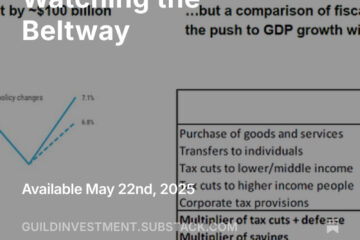Electorates, Be Careful What You Wish For
The chaotic wake of the pandemic and the ever-more-bitter partisan spirit that has taken hold in Washington has made the neutral examination of policy proposals increasingly difficult for analysts. Yet it remains a particularly critical exercise to contextualize the nearer-term dynamics of the market within the deeper political and economic trends that are operative. We may be witnessing a sea-change in those trends as the Biden administration works to parlay its slender electoral and congressional mandate into a significant expansion of entitlements: as the Wall Street Journal notes: “Federal child care, government paid family leave, free community college, a $3,600 tax credit per child, a permanent expansion of ObamaCare premium subsidies, universal pre-K, permanent expansion of the earned-income tax credit to workers without children, and more.”
Because these are universal entitlement programs, they will be particularly difficult ever to roll back — and as with Social Security and Medicare, they will consume an ever-greater portion of GDP as time goes by. Sunsetting such programs quickly becomes politically impossible.
In an era of cutthroat partisanship, we prefer to uphold the old-fashioned value of assuming best intentions in the absence of evidence to the contrary. The intention behind these expansions are surely benign — to improve living and working conditions for a broad swath of the American middle class.
We just doubt that the programs will achieve those ends. To us, they seem likely to encourage expanding dependency on government largesse. If enacted, they would, for the first time, confirm more than half of the U.S. population as recipients of a central government dole.
This, in turn, implies an ever-larger role for the central government as an allocator of the nation’s assets, directing productive activity towards its ends rather than the ends expressed by the free economic activity of the marketplace. In the end, this process increases debt, and suppresses productivity growth, economic growth, and overall economic prosperity for everyone.
These may be tradeoffs that, as a people, we democratically decide to make. We would simply argue that such a decision should be made with open eyes about the likely long-term costs.
Investment implications: From an investment perspective, this direction would begin to turn the United States into a different investment environment than it has been hitherto — closer to that of western Europe, with highly regulated markets, extensive welfare states, endemic unemployment (especially for the young and for immigrants), anemic or non-existent economic growth, reduced opportunities for business formation and creative ambition, and less of the progress-fueling “creative destruction” that has been the hallmark of great American firms for more than a century, from Ford to Alphabet. The upshot of current entitlement policy debates is critical for investors to watch, as it may set the country’s economic direction for many years to come.

